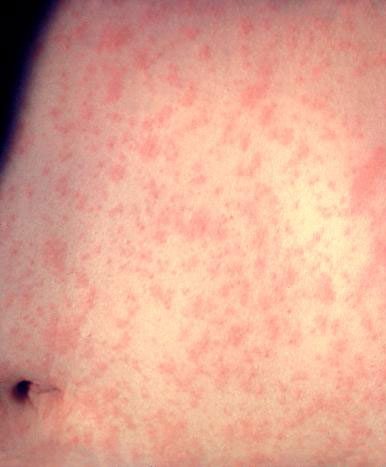Measles Can Cause Hearing Loss

There are 2 distinct diseases referred to as “Measles” – Rubella or German measles and Rubeola, known simply as measles. Both can affect hearing. They are caused by different viruses and it takes a doctor and special lab tests to tell them apart. These dangerous, unpleasant and highly contagious viral infections share some of the same symptoms, such as fever and rash. They are spread through direct contact with infected people, usually through droplets when sneezing and coughing.
Non-immune children and adults can be affected. Although complications can be serious, their effects on hearing are mostly underrated. Prevention through vaccination makes a lot of sense in populations with waning immunity.
Note: Both types of measles can have damaging effects in pregnant, non-immune mothers. Therefore, it is very important to check with the doctor on one’s measles immune status before getting pregnant.
Rubella (German Measles) pregnancy alert!
Up to 3 weeks may pass between getting infected with German Measles and the appearance of flu-like symptoms. The rash appears a few days later and lasts around 3 to 5 days. In children and in adults symptoms can be mild and so rubella is often said to be less aggressive than measles (Rubeola). It all depends on the case, of course. Although some infected people might not even get a rash, they can spread the disease.
However, especially during the first trimester, Rubella can lead to devastating pregnancy complications in non-immune mothers. These include miscarriage and stillbirth. Babies may suffer numerous lifelong disabilities related to Congenital Rubella Syndrome (CRS). Among others, deafness or severe hearing issues, vision and heart problems are common CRS complications.
Rubeola or Measles – if this sounds miserable, it is!
Measles, or Rubeola develops in stages. This is a serious disease that can lead to life-threatening complications, such as pneumonia and encephalitis (inflammation of the brain). Hospitalization is usually required. Measles encephalitis can result in hearing loss or deafness.
Measles symptoms appear 1 to 2 weeks after becoming infected. Among others, these include high fever, cough, runny nose, digestive issues and watery eyes. Next, white spots appear in the mouth followed a few days later by the rash.
Ear infections are common with measles. Permanent sensori-neural hearing loss due to inner ear and nerve damage is another possible complication. Before widespread vaccinations, it is said that measles accounted for 5 to 10% of profound hearing loss cases in the U.S.
Although more studies are needed, some scientists believe that – especially in those with weak immunity – remaining viral material that was not cleared from the body after a measles bout contributes to otosclerosis later in life. Otosclerosis is related to the tiny middle-ear bones and a cause for conductive hearing loss. As the debate over this issue continues, it is another reason for staying clear of measles.
Measles (Rubeola) infection during pregnancy of non-immune mothers is dangerous for mother and child. Although rubeola does not cause birth defects, it may lead to miscarriage, fetal death, premature births or low-weight babies.
Prevention through vaccination: Talk to the doctor
Vaccinations have a double benefit. They protect the immunized people from acquiring a nasty and even deadly disease while also preventing them from spreading the disease to others.
The MMR (mumps, measles, rubella) is typically- the most popular vaccine against these 2 types of measles. It is administered in two separate doses. According to the Center for Disease Control (CDC) one dose of MMR is 93% effective against measles and 97% effective against Rubella. The full two doses are said to be 97% effective. Those are great odds, considering that these are highly dangerous viruses that can easily cause physical and emotional damage for a lifetime.
I got measles as a child, and I remember the horrendously miserable experience to this day. I could not eat. I was sore all over from coughing and no syrup helped. I was burning up. My mom kept giving me cool baths and the pediatrician said to “ keep up hope and trust.” I wish that I had been vaccinated, but there were no vaccines back then!
For so many reasons, it is very important to have a heart-to-heart discussion with the doctor. After separating the facts from the myths, it is the patients’ or the parents’ decision if vaccination is right for them or for their children. In the end, Life is Choices!